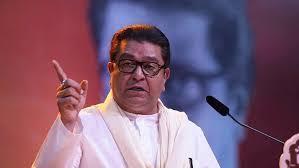
Only Marathi & English be taught in schools: Raj Thackeray to govt
The debate over the medium of instruction in schools has been a contentious issue in India, with various languages vying for prominence. In the state of Maharashtra, this issue has taken a new turn with the Maharashtra Navnirman Sena (MNS) chief, Raj Thackeray, demanding a written order from the state government to ensure that only two languages – Marathi and English – are taught from Class 1 onwards in state board schools.
In a recent development, Raj Thackeray wrote to the state government, reiterating his demand for a written order to implement the decision. The government had earlier declared that only Marathi and English would be taught in schools, but failed to issue a written order, a move that has left many wondering if the government is serious about implementing the decision.
The MNS chief warned that if the government does not take immediate action, his party will launch an agitation to ensure that the decision is implemented. This is not the first time that Raj Thackeray has raised this issue, and his party has been vocal about the need to promote Marathi as a medium of instruction in schools.
The demand for a written order is not a new one, and it has been pending for some time now. In 2019, the state government had announced that it would make Marathi a compulsory subject from Class 1 to Class 8, and that English would be taught as a second language. However, the government failed to issue a written order, leading to confusion among schools and parents.
The decision to make Marathi a compulsory subject was taken to promote the language and to ensure that students have a better understanding of their culture and heritage. Marathi is the official language of Maharashtra, and the state has a rich cultural heritage that is closely tied to the language. By making Marathi a compulsory subject, the government aimed to promote the language and to ensure that students have a better understanding of their cultural roots.
However, the decision has not been without its controversies. Many schools in the state have been teaching English as a medium of instruction, and the decision to make Marathi a compulsory subject has been seen as a threat to the English-medium education system. Many parents and students have expressed concerns that the decision will limit their options and make it difficult for them to pursue higher education in English.
The debate over the medium of instruction is not new, and it has been a contentious issue in India for some time now. The government has been trying to promote regional languages, including Hindi and Marathi, as mediums of instruction, but English remains the most popular choice among parents and students.
The decision to make Marathi a compulsory subject has also been seen as a move to promote national integration. Marathi is the official language of Maharashtra, and the state has a rich cultural heritage that is closely tied to the language. By making Marathi a compulsory subject, the government aims to promote national integration and to ensure that students have a better understanding of their cultural roots.
The government has been trying to promote regional languages, including Hindi and Marathi, as mediums of instruction, but English remains the most popular choice among parents and students.
The decision to make Marathi a compulsory subject has also been seen as a move to promote cultural heritage. Marathi is the language of Maharashtra, and the state has a rich cultural heritage that is closely tied to the language. By making Marathi a compulsory subject, the government aims to promote cultural heritage and to ensure that students have a better understanding of their cultural roots.
The decision to make Marathi a compulsory subject has also been seen as a move to promote job opportunities. Marathi is the official language of Maharashtra, and many government jobs require proficiency in Marathi. By making Marathi a compulsory subject, the government aims to promote job opportunities and to ensure that students have a better understanding of their cultural roots.
In conclusion, the decision to make Marathi a compulsory subject from Class 1 to Class 8 has been a contentious issue in Maharashtra. While the government aims to promote Marathi as a medium of instruction and to ensure that students have a better understanding of their cultural roots, many parents and students have expressed concerns about the decision. The government has failed to issue a written order, leading to confusion among schools and parents. The MNS chief has warned that if the government does not take immediate action, his party will launch an agitation to ensure that the decision is implemented.
Source: https://x.com/RajThackeray/status/1930208483518857496






